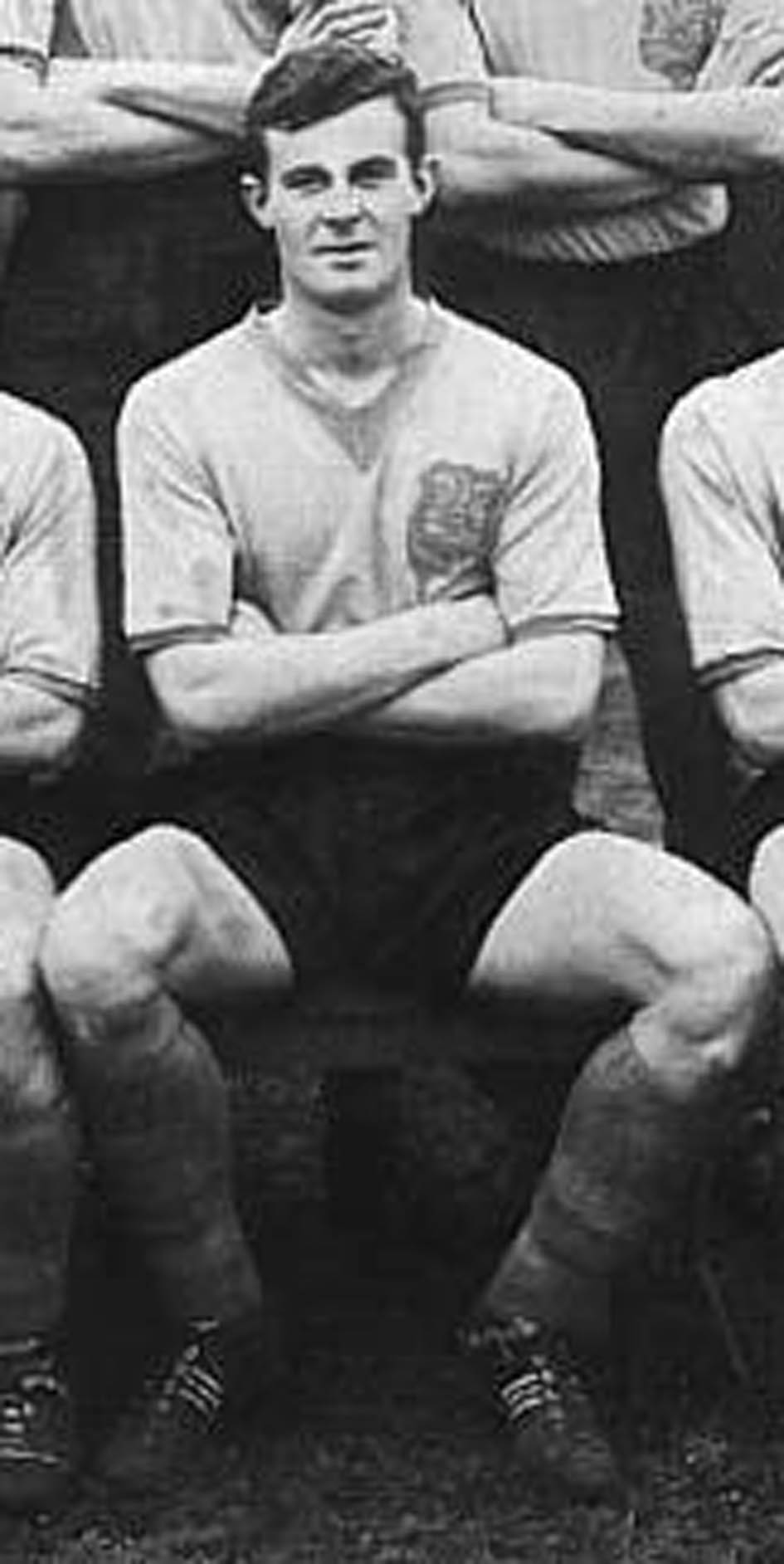

Shackleton: Alan
1958-1959
(Player Details)
Centre Forward
Born: Padiham, Nr. Burnley: 03-02-1934
Debut v Manchester United (h): 01-11-1958
5’11” 11st 5lb (1959)
A local lad from Padiham, Shackleton started his career in the early nineteen-fifties on
amateur forms in the Burnley Junior teams as an outside-left. It was interrupted due to
compulsary National Service and during this time he played for a year on Bolton Wanderers
books, in the 1953-54 season, as an amateur before being signed by Frank Hill, on
professional forms, for Burnley in May 1954, now having turned twenty and converted to the
centre-forward position. It was a hard road for him to travel, as Burnley were blessed with
a fine goal poacher in Peter McKay and had several youngsters all vying for his spot and it
was almost three years before he got his first-team opportunity. When McKay left the club to
return to St Mirren in his native Scotland, the almost twenty-four-year-old Shackleton seemed
to have the inside rail as he had been outscoring the teenage Ian Lawson in their Central
League games. However, it was Lawson who was given his chance, and he took it. He scored eight
goals in just four games. In the FA Cup, with a four goal haul against Chesterfield, on debut,
and a hat-trick just days later against New Brighton, saw Shackleton still playing second
fiddle. It was not until the Sixth Round F.A. Cup Replay on 6th March 1957 with Aston Villa at
Villa Park that Shackleton displaced Lawson to make his debut in a game that Burnley lost 0-2.
There remained a rivalry between the two for the rest of the season, as Shackleton was
retained for the subsequent League game at home to Sunderland which this time saw Burnley win
2-0. He scored in the ensuing 2-0 win at Luton on 16th March, and went on to net five goals in
nine League games that season. However, in the following season of 1957-58 it was Shackleton
that prevailed and consigned the younger Lawson to the Reserves to learn his trade. Shackleton
soon hit a rich vein of form and scored six goals in the first seven games of the new season.
He was a regular scorer for Burnley, but "The Blond Bombshell", Ray Pointer, had emerged and
was looking to take over Shackleton's shirt. Three defeats in a row, saw Shackleton make way
for the new sensation. Pointer was given his chance but scored just two goals in six games
and Shackleton was re-instated but, eventually, it would be Ray Pointer that was the Clarets’
first choice striker. But, in that season, Shackleton scored ten goals in nineteen games,
while Pointer managed only eight from his twenty-two appearances, but there were healthy
contributions from all the Burnley forwards. Nevertheless, Shackleton managed a commendable
eighteen goals in thirty-two appearances at Turf Moor in four and a half years. Although he
scored three goals in three games in the 1958-59 season, it was Pointer that had taken over
the centre-forward position. His final game for Burnley was in a 1-2 defeat at St Andrew's
by Birmingham City on 13th September 1958. He was spotted by Leeds playing for Burnley in a
Lancashire Senior Cup-tie at Accrington Stanley and he joined United in October 1958 for
£8,000. He maintained a good scoring rate in an underachieving Leeds team, including scoring
on debut and adding a hat-trick in just his fourth game, in a 4-2 win at Ewood Park over
Blackburn Rovers on 22nd November 1958 and another just before the end of the season in a
3-0 win at Nottingham Forest on 22nd April 1959. He was United’s leading scorer in a
struggling side in the 1958-59 season with sixteen goals in just twenty-eight League games
and another goal in the FA Cup in the only Cup game that season. He did not stay long,
however, and after just eleven months, in September 1959 for £8,250, he moved to Everton.
They were searching for a replacement for Dave Hickson, who had been surprisingly sold to
Aston Villa. He made his Everton debut on 12th September 1959 at the City Ground Nottingham
in a 1-1 draw with Forest. On 14th November 1959 in a vital relegation battle at Goodison
Park with Birmingham City, he gave Everton the perfect start with a goal after five minutes
and in just the tenth minute added a second. Ten minutes into the second half Jimmy Harris
added a third and in the seventieth minute Shackleton completed his hat-trick to give Everton
a fine 4-0 win. Despite maintaining his scoring ratio with ten goals in twenty-six League
games and making one F.A. Cup appearance without scoring, at Goodison Park, his career then
drifted, as the Toffees struggled. His last game for them was against Manchester United at
Old Trafford, in a 0-5 drubbing on 30th April 1960. His next game was in Non-League football
for Nelson. He joined the Lancashire Combination team in July 1960 and played a year at
Seedhill before returning to League Football with Oldham Athletic, then in the Fourth Division,
in August 1961. He played just ten games for them although he added another seven goals to his
impressive tally, before leaving in May 1962. From there he played for Tonbridge, along with
ex-Leeds United teammates Gerry Francis and John Kilford, in the Southern League First Division,
where his career came to an end. His League career was just ninety-seven games in which he
scored no fewer than fifty-one goals, but despite that he was never able to command a regular
place in the first team at any of his four League clubs. He died on 26th April 2009 in Bromley,
Kent, at the age of seventy-five after a short illness.